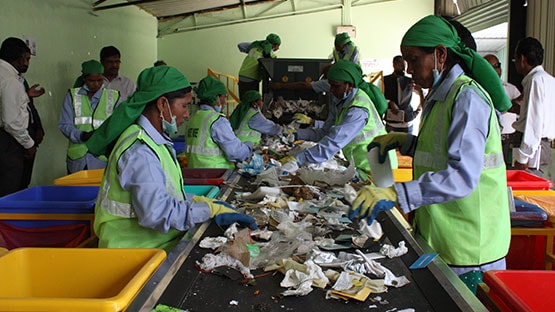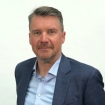SweepSmart - A European solution to India’s waste problem
SweepSmart makes waste sorting centres in Bangalore more efficient and at the same time fulfils a social function.
With its 1.2 billion inhabitants and inadequate waste processing, India has a huge waste problem. In the megacity of Bangalore, the Dutch company SweepSmart is now working on a European-standard waste processing system. In doing so, the company also has a clear social function.


“India has gigantic rubbish dumps throughout the country that are constantly heating up and smouldering and contaminating the groundwater,” says Silvia de Vaan, who founded SweepSmart together with Niels van den Hoek. “Those mountains of waste are often so big,” she says, “ that when you’re on top you can look out over a whole megacity. On such waste heaps, thousands of ‘waste pickers’ earn a tiny income, for example by collecting and selling paper and plastic bottles and selling them to the recycling industry.”
By adapting European knowhow to the Indian context, SweepSmart is now making existing waste sorting centres in Bangalore more efficient. The company also makes use of the existing informal recycling process with impoverished waste pickers selling what they have collected to local dealers.
Government and citizens demand change
This approach is in line with the wishes of both the Indian government and the country’s people. These are beginning to exert pressure to tackle the problem of waste and thus prevent further environmental damage and ensure quality of life.
Silvia de Vaan explains: “Indian cities are struggling with serious environmental problems, and also, for example, a lack of space for new landfills. Central government is also aware that things can’t go on like this. The Indian Prime Minister, Narendra Modi, has therefore launched a ‘clean India’ campaign.” In addition, a group of prominent citizens initiated court proceedings against the city of Bangalore five years ago to compel it to tackle the problem posed by waste. “The court case has already led to changes,” says Silvia de Vaan, “because the city has now introduced waste separation. That made Bangalore a suitable place to test out our business case.”

Combined waste system
De Vaan and Van den Hoek see the solution to India’s waste problem in a combined system of decentralised waste processing – as is done at 180 waste sorting centres in Bangalore – as well as with large central processing units. “Households in Bangalore separate their waste into three types,” says Van den Hoek, “dry recyclable, organic, and non-recyclable. The dry waste then goes to sorting centres, organic waste to a biogas or composting facility, and the remainder still has to go to a landfill or incinerator. But the volume is then significantly less.”
SweepSmart’s social function
Of the 180 waste sorting centres in Bangalore, SweepSmart has upgraded, expanded, and transformed three into efficient facilities. Van den Hoek explains: “Of course, you can take all the waste to a large incineration plant, but then there is no recycling and the waste pickers no longer have an income. In order to get them involved in our initiative, we’ve entered into partnerships with organisations that represent them and given them jobs at the new sorting centres. That means that SweepSmart is fulfilling a clear social function.”

Greater efficiency with technology
Thanks to the use of an ingenious conveyor belt, the waste sorters (or “waste managers”) can now work standing up instead of crouching down and are able to sort more waste than before. Van den Hoek explains: “The conveyor belt has two speeds, meaning that the waste is more or less pulled apart, which makes sorting easier. The system was conceived and designed in Europe, but we had a simplified version made in India. The centres now also have a machine for compressing sorted waste into blocks for easy storage and transport.”
Instead of just one tonne of waste, the centres that SweepSmart has upgraded can now process four to five tonnes each day with the same number of workers. “Greater efficiency is important,” says De Vaan, “because processing more waste means earning more money. At the moment, the 180 waste sorting centres are not able to process all of Bangalore’s dry waste, but that would become possible if they all implemented the SweepSmart system.”
Tracking data gives a good idea of productivity
SweepSmart has created a data dashboard for the three sorting centres so as to keep track of the flows of waste. “A dashboard is necessary,” says De Vaan, “because if you want to run such a centre efficiently, you need to know how much waste passes through, what the level of productivity is, why it changes, and how you can increase it.” Van den Hoek adds: “The data that the centres used to retain just disappeared into a folder and no use was made of it. The team are now so well trained that they monitor everything closely and record it all. Thanks to effective training, the waste managers can now in fact manage a small production line. They all belong to the lowest caste, but they now have a job they can be proud of.”


Levy on waste needed
SweepSmart’s business model involves a number of different value streams. “Selling usable materials to the existing recycling sector generates money,” says Van den Hoek. “That stream will be increased by at-the-source separation, because the dry waste is then already a separate stream that can be processed more efficiently at the sorting centres. You can also earn money from organic waste by composting it or using it to manufacture biogas. But for waste processing to be fully profitable, India will also have to impose a kind of waste levy. That’s increasingly happening in progressive municipalities.”
The city of Bangalore has asked SweepSmart to upgrade another ten waste sorting centres. The long-term aim is for all 180 sorting centres to be converted and to implement the SweepSmart work process. “The city pays us,” says De Vaan, “for each centre that we construct or reconstruct. After a while, each sorting centre will be handed over to a local organisation, which will then have to pay SweepSmart for the services provided.”
The future and the aim
De Vaan goes on to say: “The city has also asked us to set up a system for household waste collection services, smart waste centres, and collection and processing organic waste. Our working method is always to first test if it works and then to expand. We want to help solve India’s waste problem, but at the same time we also want to develop a scalable model. In the longer term, we want to offer our approach not only throughout India but in all less developed countries.”

Fellow students find one another in social enterprise
After studying in Delft, Silvia de Vaan worked for the Boston Consulting Group and during her time there she was seconded to a social enterprise in biogas systems. She travelled to India for that enterprise and after seeing the gigantic heaps of rubbish there, her interest in India’s waste problem was born.
She already knew Niels van den Hoek – who was working for the Van Gansewinkel waste management company – from when they were students, and her experience in India led to him using his expertise regarding waste to join her in tackling the waste problem there.
Things really took off after the two founders of SweepSmart won the 2014 incentive prize for their business case in the Ministry of Foreign Affairs’ ‘“Partnership Election’”. Van Gansewinkel made it possible for the two of them to go to India for a few weeks to look at the waste problem from close up.
Social Impact Lab
In September 2017, SweepSmart was one of the winners in PwC’s Social Impact Lab., In addition to a cash prize, winners receive two years coaching from PwC. “PwC calls it coaching,” says Silvia de Vaan, “but in fact it’s two years’ of support. A team of six PwC professionals are advising us on a range of topics. It’s a great feeling to have a whole team behind you who help you take big decisions. That enables us to really become more professional.” Niels van den Hoek adds: “It’s also good to talk to people who look at our company from a different perspective. And what’s more, PwC’s people in India are now advising us from within the Indian context.”
Contact us
















